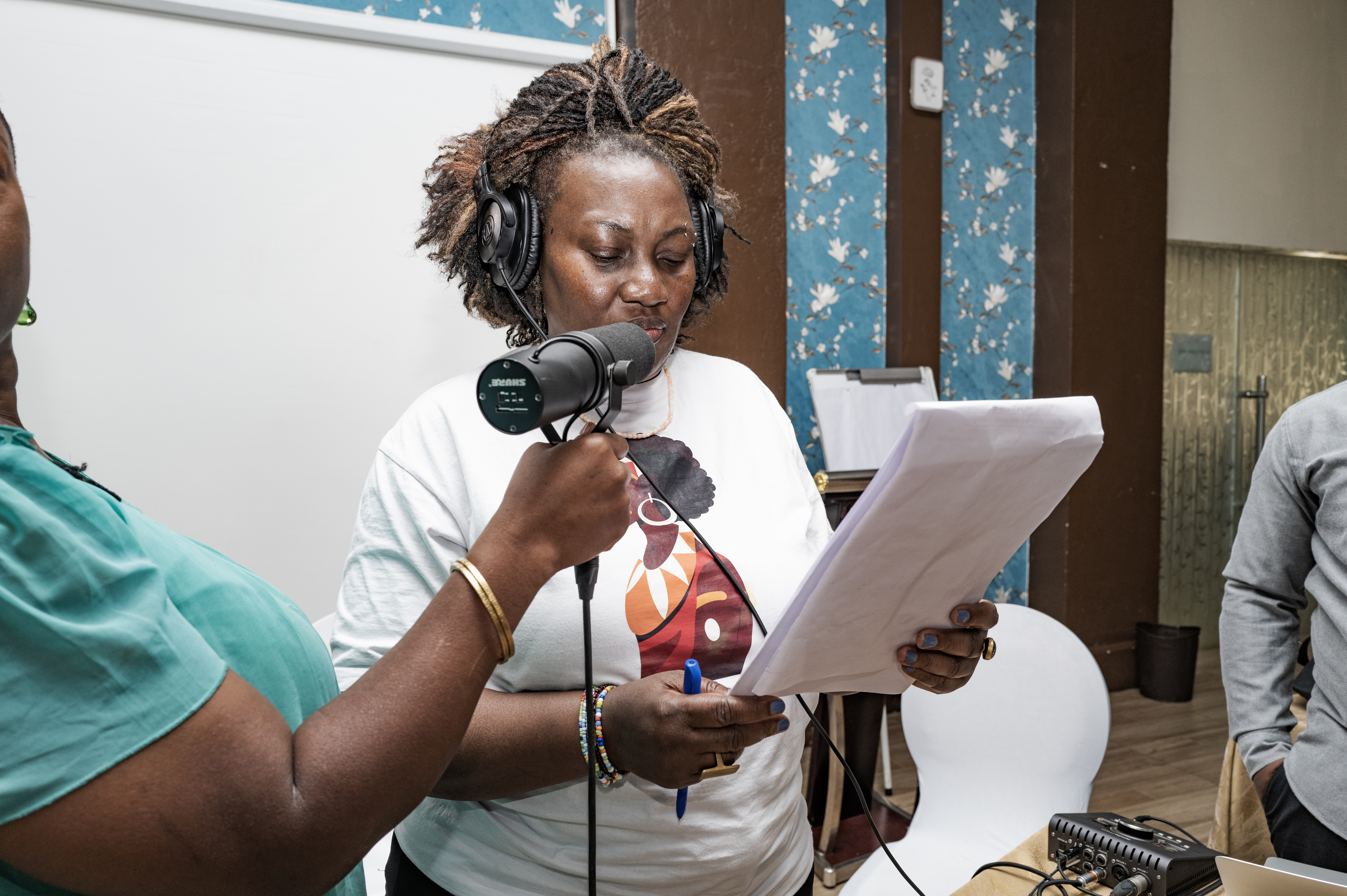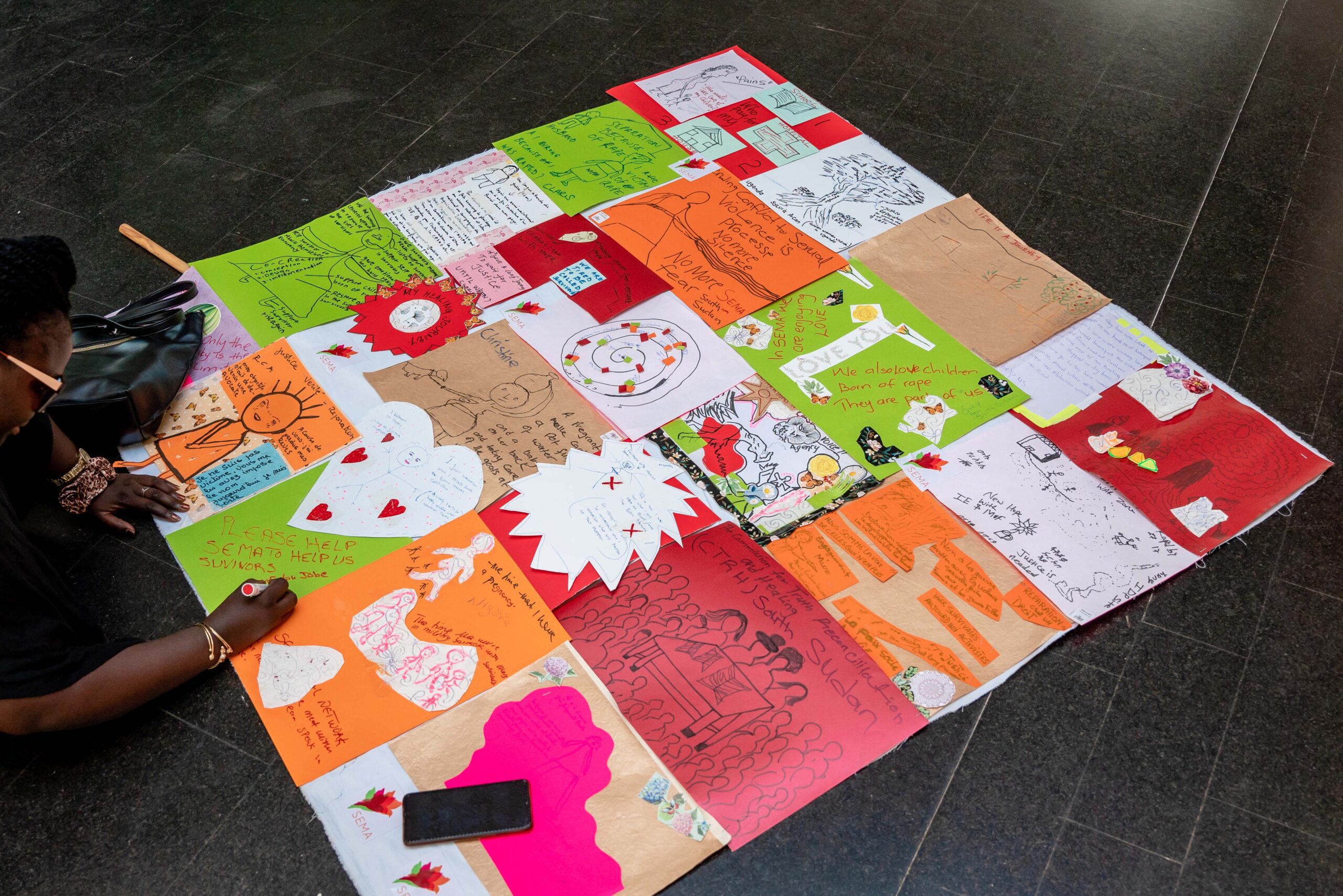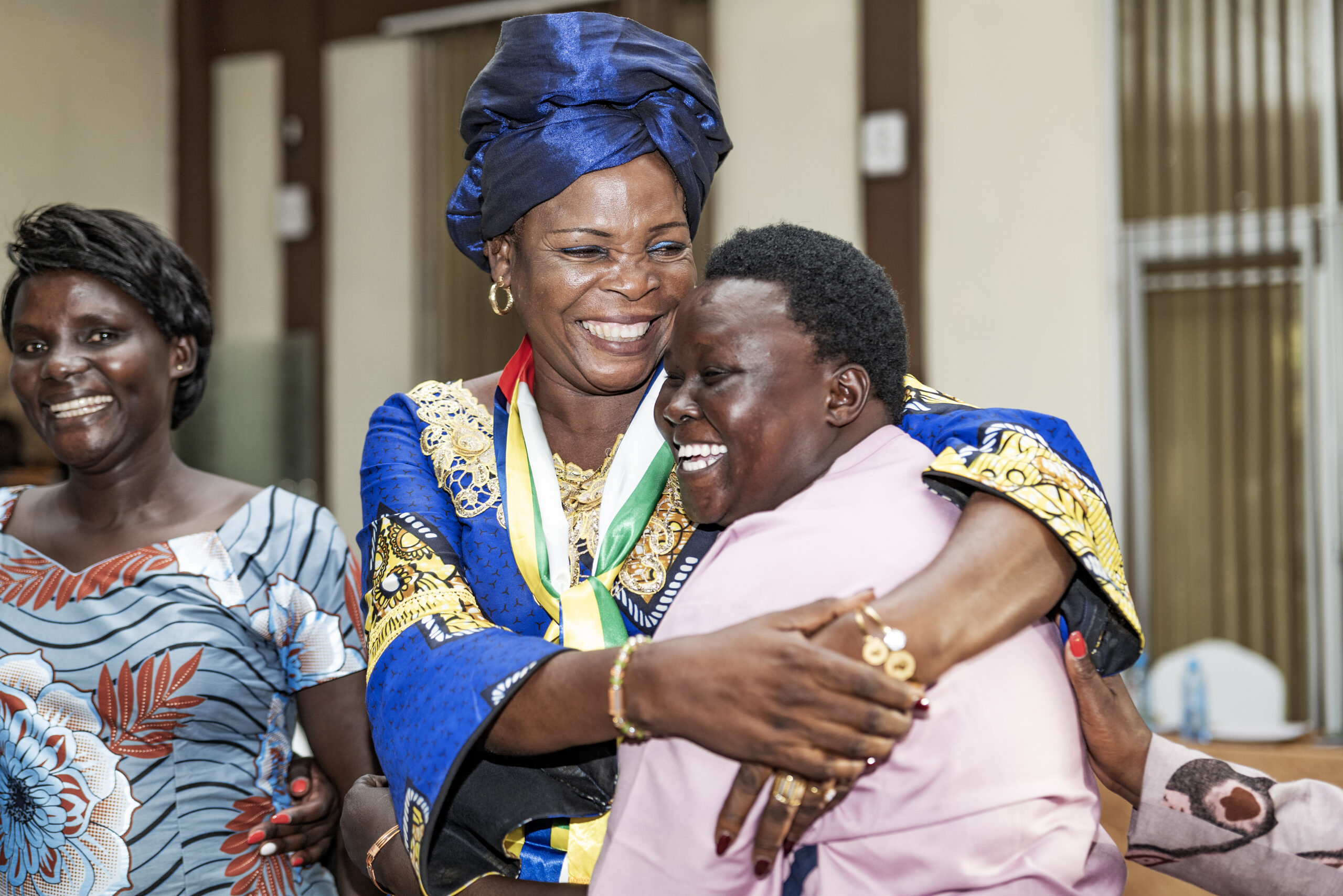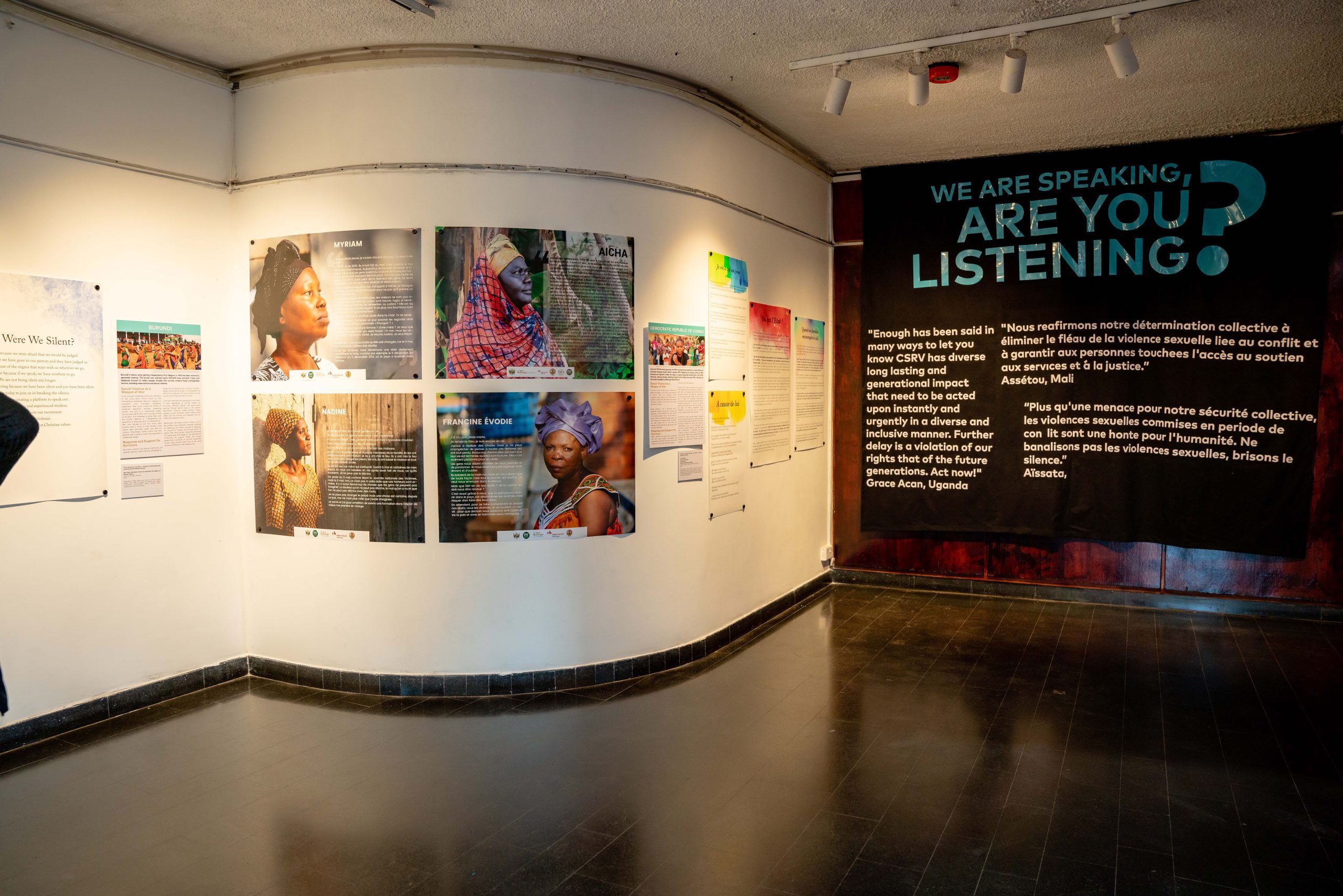March 13, 2024
SEMA Regional Retreat 2023: “No fear, no stigma, no shame”
Survivors of conflict-related sexual violence reunited in Nairobi
In a significant stride towards amplifying the voices of survivors of conflict-related sexual violence (CRSV), the Mukwege Foundation organised the SEMA regional retreat in Nairobi, Kenya. This retreat included three days of workshops and ended with the third launch of the Red Line Initiative Guidebook and the opening of the SEMA Art Exhibition titled “We Are Speaking, Are You Listening?” This landmark event marked the 6th SEMA retreat and the 2nd regional retreat in Africa, uniting survivors from Kenya, Uganda, Zimbabwe, Rwanda, Central African Republic, Mali, Guinea, Nigeria, Ethiopia, Gambia, and South Sudan.
What is a SEMA retreat?
The SEMA retreat is organised by the Mukwege Foundation with members of SEMA, the Global Network of Victims and Survivors to End Wartime Sexual Violence.
It provides survivors with an opportunity for unified reflection, strategic discussion, peer learning and provision of support for each other. Thus, the SEMA retreat agenda was crafted through consultations with SEMA members, and delved into advocacy strategies, reparations, transitional justice and collective memory, children affected by CRSV, understanding legal frameworks that deal with CRSV, regional cooperation and reflecting on in-country initiatives to progress SEMA.
SEMA Retreat: Voices Amplified

SEMA members write a song that advocates for their rights, Nairobi, 2023. Photo: Mona van den Berg.
A few key highlights from the retreat started with Jackie, SEMA member from Kenya, providing an insightful overview of the SEMA Network, emphasizing its Swahili meaning – “Speak up” – reflecting the network’s main objective of breaking the silence surrounding CRSV.
Jackie detailed SEMA goals and achievements, including songs, photo exhibitions, publications, and active participation in global advocacy events.
Agatha Ndonga, from the International Center for Transitional Justice, further led the session aimed at enhancing understanding of the link between collective memory and traditional justice and exploring practical ways of advancing advocacy messages from the SEMA Network.
The session provided insights into the complexities and ongoing processes of transitional justice at the African level, emphasizing the importance of inclusivity and constant engagement.
Agatha also underscored the significance of collective memory serving as a platform for interpreting significant past events, establishing a shared understanding of human rights abuses, preserving facts, honouring victims, and promoting reconciliation through facilitated dialogue.
Survivors Movements in Africa
As part of this session, presenters Miryam from MOSUCA (Mouvement des Survivant.e.s en Centrafrique) and Evodie from CNAV-CA (Collectif national des associations de victimes de Centreafrique) shared insights on survivor movements in war-torn CAR, spanning 20 years of conflict.
- MOSUCA mobilizes women survivors, boasting 10 organizations and over 700 members across CAR’s provinces. They are breaking the silence on wartime violations.
- CNAV-CA was founded in 2020 and aids survivors in seeking justice and reparations for various violations.
Both movements advocate for memorialization, truth-telling, and capacity building, supported by the Bosch project. Workshops featuring creative activities have empowered survivors to share stories through poetry, music, and plays.
In Guinea, Asmaou and Oumou from AVIPA (Association des victimes, parents et amis du 28 septembre 2009) discussed their 14-year journey supporting victims of the 2009 stadium massacre.
AVIPA utilises music therapy, has published a book, and has established a Centre for Survivors with economic empowerment programs and psychosocial support.
The reflection on transitional justice and collective memory ended with an activity allowing survivors to express their feelings, aspirations, and experiences through art.
The collective memory exercise highlighted various issues, including the overburdening roles of women, acknowledgement of children affected by CRSV, frustration over being ignored by policymakers, and the need for justice and reparations.

Survivors in a collective memory exercise.
“The retreat is transformative,” Liz from Kenya

SEMA members heal together, Nairobi, 2023. Photo: Mona van den Berg
“I am glad to have the opportunity to be here, there were ups and downs in our country which was very difficult. Women in Ethiopia cannot speak up yet they have suffered a lot. Lots of women do not have access to justice, accountability, or access to medical care. Yesterday’s session was comforting, and I got many benefits from the discussions. I ask for solidarity with the women survivors of Ethiopia.” Mulu, Ethiopia
Red Line Initiative: Guidebook on States Obligations for CRSV
A pivotal moment of the 2023 SEMA regional retreat was the public event “African Launch of the Guidebook on State obligations for CRSV” at the Mukwege Foundation organised at the Alliance Française of Nairobi.
The Guidebook sets out existing State obligations for CRSV across prevention, justice, accountability, humanitarian response and reparations. It serves as an accessible tool for survivors, state representatives, and civil society organisations, outlining states’ legal obligations on sexual violence in conflict under international law.
The French Deputy Ambassador in Nairobi, M. Lionel Fabre, opened this relevant event. After the opening, the Mukwege Foundation convened a roundtable discussion to present this legal tool developed as part of the Red Line Initiative.
The British High Commissioner to Kenya, H.E. Neil Wigan OBE, opened the discussion, followed by the panellists Katrien Coppens and Erin Farrell Rosenberg, Executive Director and Senior Legal and Policy Advisor at the Mukwege Foundation, Grace Acan, SEMA member from Uganda, Yvonne Anyango Oyieke, Executive Director at Utu Wetu Trust and Kirsty Hare, Programme Manager at LAW, addressed crucial questions.
These questions ranged from the role of the African regional human rights system in responding, eradicating and enhancing accountability for CRSV, to exploring the use of the Legal Guidebook by States, survivor activists, and civil society in the ongoing battle against CRSV. Moreover, the panel critically examined how a more appropriate, robust, and timely response by States, aligning with their international obligations as outlined in the Guidebook, can be ensured.
Collective Memory Exhibition: We Are Speaking, Are You Listening?
In synergy with this launch, the 2023 SEMA Art exhibition “We Are Speaking, Are You Listening?” was inaugurated. Jaqueline Mutere, SEMA member from Kenya, opened the exhibition with the reading of the poem “We Rise” that she wrote on behalf of SEMA members.
This reading performance was followed by a collective performance from all the survivors attending the retreat who went on stage to sing the new SEMA song “Freedom is here”. Attendees were then invited to visit the exhibition, a collection of 28 artworks from 13 out of the 26 SEMA countries ranging from a display of songs, poems, and letters to children born as a result of CRSV, drawings and photos to documentaries, body maps, testimonies of survivors, portraits of SEMA members and quotes by survivors.
The exhibition aimed to convey messages of memory and community and sustain the narrative, reflecting SEMA’s long-term commitment to multiple exhibitions, each highlighting different facets of collective memory work.
If you would like to check the collective memory catalogue detailing all of the artworks shown at the exhibition, please visit this link for an English version.
If you would like to read it in French, please visit this link.

Collective Memory Exhibition by SEMA, Nairobi 2023
Next steps
In 2023, the SEMA regional retreat served as a pivotal platform for survivors to share experiences, strengthen advocacy efforts, and reaffirm their commitment to breaking the silence surrounding CRSV. The launch of the Red Line Initiative Guidebook and the powerful SEMA exhibition underscored the collective resilience and determination of survivors worldwide.
As SEMA continues its global advocacy journey, it stands as a beacon of solidarity, breaking barriers and fostering meaningful change.
Thank you
We extend our gratitude to the survivors and the collaborators who appear in the videos above. This SEMA Regional Retreat 2023 was possible thanks to your trust and support.
















